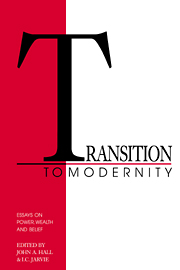Book contents
- Frontmatter
- Contents
- List of illustrations
- List of contributors
- Introduction
- PART I THE PRE-MODERN WORLD
- PART II TRANSITIONS TO THE MODERN WORLD
- 4 On a little known chapter of Mediterranean history
- 5 Ernest Gellner and the escape to modernity
- 6 The emergence of modern European nationalism
- 7 Sovereign individuals
- PART III MODERNITY AND ITS DISCONTENTS
- Indexes
6 - The emergence of modern European nationalism
Published online by Cambridge University Press: 02 February 2010
- Frontmatter
- Contents
- List of illustrations
- List of contributors
- Introduction
- PART I THE PRE-MODERN WORLD
- PART II TRANSITIONS TO THE MODERN WORLD
- 4 On a little known chapter of Mediterranean history
- 5 Ernest Gellner and the escape to modernity
- 6 The emergence of modern European nationalism
- 7 Sovereign individuals
- PART III MODERNITY AND ITS DISCONTENTS
- Indexes
Summary
The story is often told against the citizens of West Hartlepool, on the northeast coast of England, that during the Napoleonic Wars a ship was wrecked offshore and a ship's monkey, dressed in uniform, was washed ashore alive. The good people of Hartlepool hung it as a Frenchman.
This story may be apocryphal, but I will show that it aptly symbolises much of the rise of nationalism. I define nationalism conventionally as an ideology which asserts the moral, cultural and political primacy of an ethnic group (real or constructed). This conventional definition allows for two main sub-types of nationalism, cultural and political, each of which has its peculiarities. In Europe the assertion that an ethnic group had distinctive cultural virtue often preceded agitation to secure its own state – as in 18th century Ireland1 or Germany (discussed here). Yet it was typically espoused by only a few intelligentsia. Political nationalism was often more broadly based where the ethnic group did not have its own state (Italians or Czechs in the 19th century), yet was almost invisible when it did (England in the 19th century). In both cases, however, political legitimation was vested in what were supposed to be the peculiar virtues of ‘the nation’, in fact of ‘this particular nation’, in the sense of ‘the people’. I shall therefore look for the emergence of ‘popular’ national ideological elements and for evidence of popular support or mobilisation in both cultural and political movements.
My aim is to establish when and why such nationalism first emerged as a mass phenomenon in Europe, beginning with and then revising Ernest Gellner's explanation of this.
- Type
- Chapter
- Information
- Transition to ModernityEssays on Power, Wealth and Belief, pp. 137 - 166Publisher: Cambridge University PressPrint publication year: 1992
- 25
- Cited by



